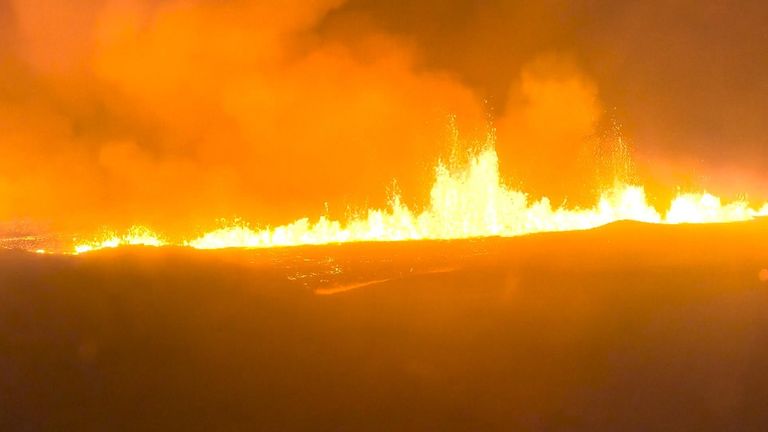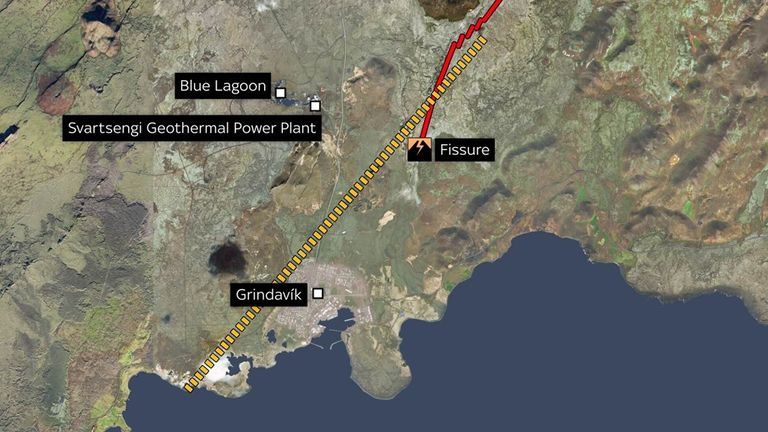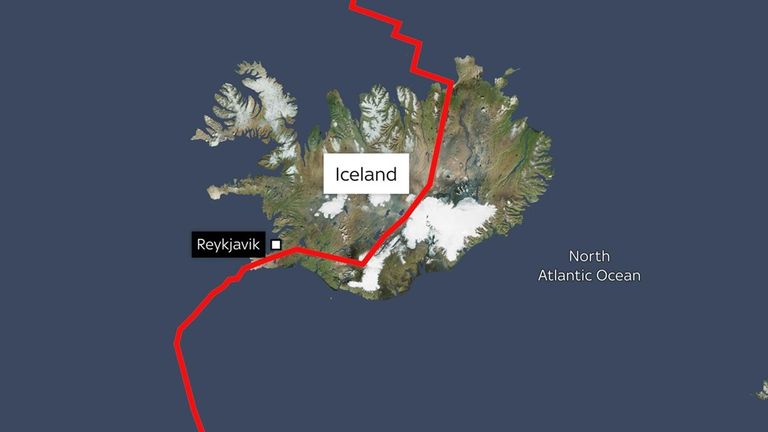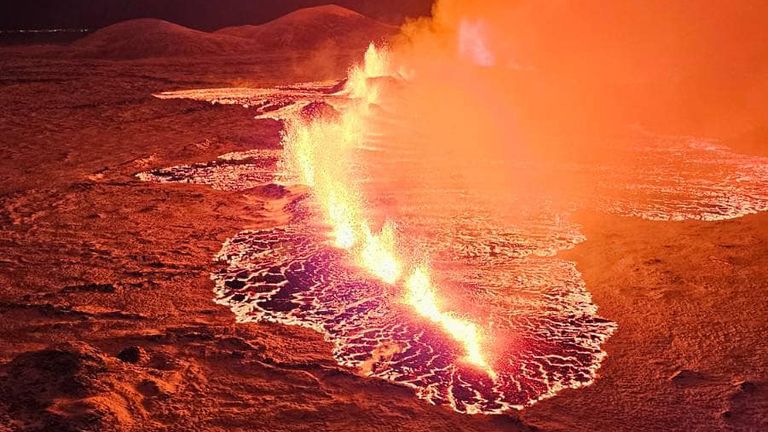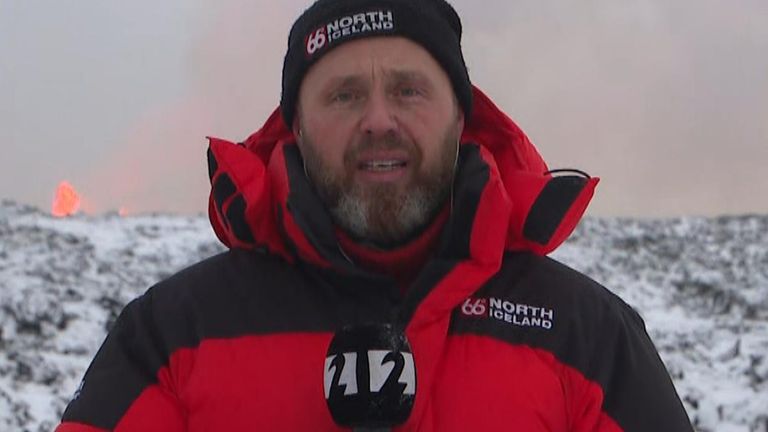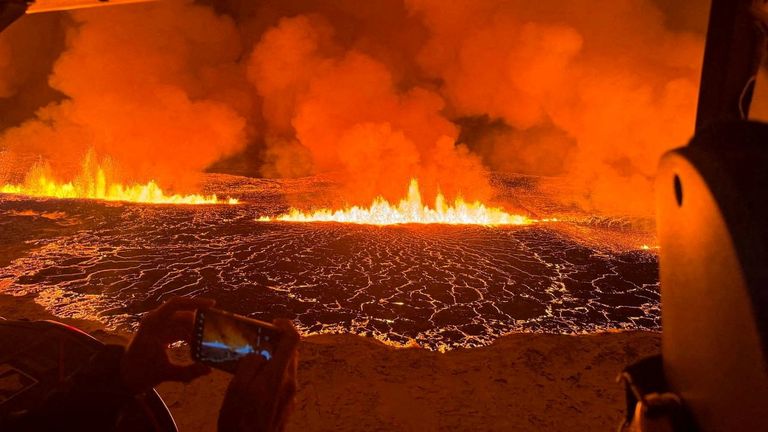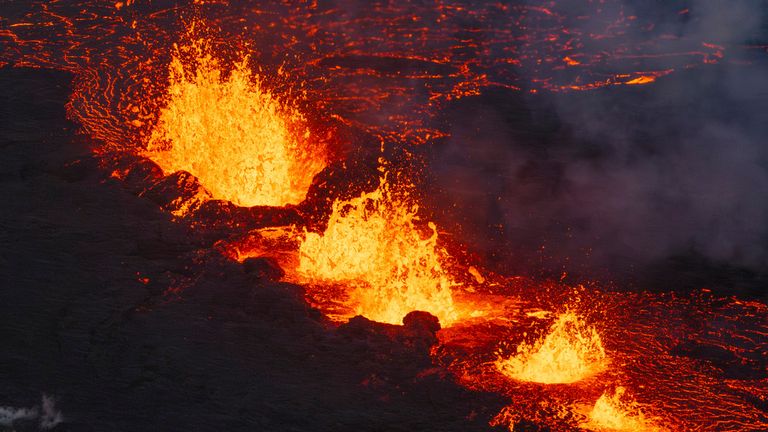
Astonishing drone footage has emerged showing both the beauty and destructive nature of Iceland’s erupted volcano.
A gash two miles long has opened up on the Reykjanes peninsula, spewing between 100 and 200 cubic metres of lava every second.
The erupting lava has now been filmed from above, capturing the burning bright molten rock spewing from the earth, before splitting into small tributary-like flows.
Iceland volcano – latest: Warning volcanic eruption could last ‘for months’
Though the lava flow has abated, the Icelandic Met Office says more magma could yet flow from deep within the earth to fuel the fire fountains and perhaps open up new fissures.
Experts say the lava flow could stop over the weekend or next week, or could carry on at a slower rate for weeks or months.
‘Don’t visit the site’
It comes as people in Iceland have been told to stay at home and “get into the Christmas spirit” rather than attempt the risky journey to the eruption site.
Hjordis Gudmundsdottir, communications director for Iceland’s civil defence department, told Icelandic broadcaster RUV that while the lava flow has become less intense, things could still change quickly.
Ms Gudmundsdottir also said teams had spent “a lot of time” turning away people trying to reach the site.
She told RUV that the walk to the fissure is “particularly difficult” and there is a risk of people falling into cracks in the ground.
It would be better to do some Christmas shopping, “get into the Christmas spirit or maybe just have a hot cocoa at home and wrap Christmas presents”, Ms Gudmundsdottir said.
Vidir Reynisson, the head of Iceland’s Civil Protection and Emergency Management, had previously warned that the eruption site was “not a tourist attraction” and warned people to stay away from the area.
It comes after Icelandic media reported that a hiker had to be rescued after getting lost near the eruption site last night.
News website Iceland Monitor cited coast guard officer Asgeir Erlendsson as saying the man had been found safe after a search and brought to safety in a helicopter.
“The helicopter found him and took him back to town,” Mr Erlendsson told the website.
“He had become very cold and had left his equipment with a flashlight in another place, which is why it was thought that these were two men.”
‘Definitely reducing’
It is five weeks since 4,000 people were evacuated from the nearby fishing town of Grindavik in the middle of the night after an intense swarm of earthquakes.
Seismic activity petered out in the following days and scientists began to wonder whether the magma would solidify and never reach the surface.
But on Monday night there was another earthquake swarm and the surface ripped open soon after.
Scientists are using GPS signals from space to precisely measure the height of the ground around the volcanic site.
It had risen by 35cm in some areas, pushed up by the magma rising from beneath.
More from Sky News:
Inside Iceland’s evacuated ‘ghost town’
What is happening under the volcano’s surface?
Since the eruption it has slumped back down by 5cm, an indication that at least some of the pressure below ground has been vented.
But the Icelandic Met Office says more magma could yet flow from deep within the earth to fuel the fire fountains and perhaps open up new fissures.
Dr Katie Reeves, a teaching fellow at the University of Warwick, told Sky News it has been a “really intense but shorter event”.
“The actual lava output is quite significant in this eruption. I believe it’s comparable to the month-long eruption in [July and August] 2023 already in a couple of days,” she said.
The eruption fissure has localised into two “active areas” where cones are now building, Dr Reeves said, though its intensity is “definitely reducing”.
“It may continue at this rate. It may also increase in its rate or open up further along the actual fissure system,” Dr Reeves said.
Halldor Geirsson, associate professor at the Institute of Earth Sciences at the University of Iceland, added: “It is difficult to see exactly what is going on, but when you get some glimpses through the snow it is obvious that it is just less and less lava flow.”
Mr Geirsson said the eruption could stop over the weekend or next week, or lava flows could carry on at a slower rate for weeks or months.
The “most likely scenario is that it just stops”, he said.
“But if that happens, the pressure will start building again in the magma chamber, which is likely to trigger another eruption after a few weeks,” he added.

